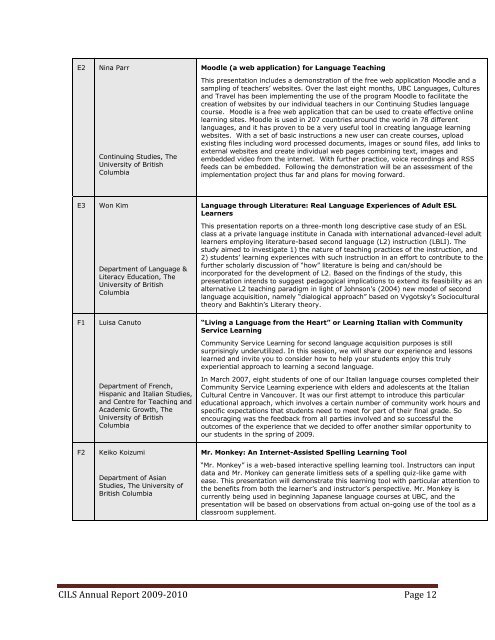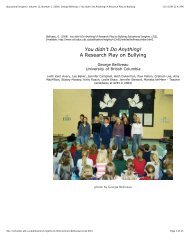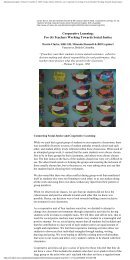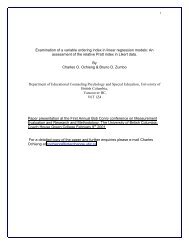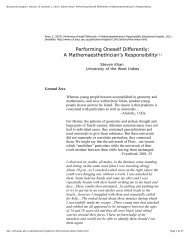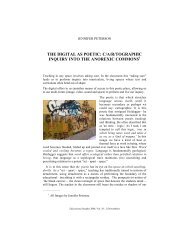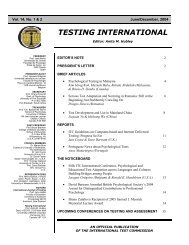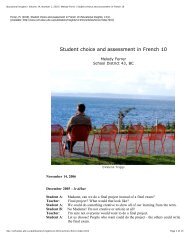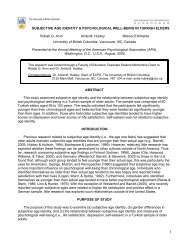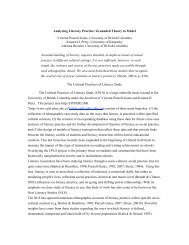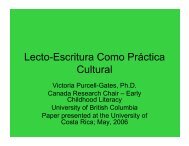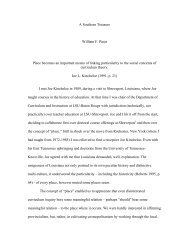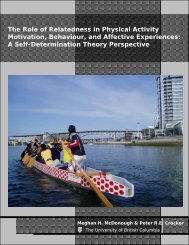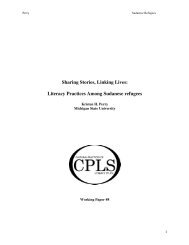The Centre for Intercultural Language Studies (CILS)
The Centre for Intercultural Language Studies (CILS)
The Centre for Intercultural Language Studies (CILS)
You also want an ePaper? Increase the reach of your titles
YUMPU automatically turns print PDFs into web optimized ePapers that Google loves.
E2 Nina Parr<br />
Continuing <strong>Studies</strong>, <strong>The</strong><br />
University of British<br />
Columbia<br />
E3 Won Kim<br />
Department of <strong>Language</strong> &<br />
Literacy Education, <strong>The</strong><br />
University of British<br />
Columbia<br />
F1 Luisa Canuto<br />
Department of French,<br />
Hispanic and Italian <strong>Studies</strong>,<br />
and <strong>Centre</strong> <strong>for</strong> Teaching and<br />
Academic Growth, <strong>The</strong><br />
University of British<br />
Columbia<br />
F2 Keiko Koizumi<br />
Department of Asian<br />
<strong>Studies</strong>, <strong>The</strong> University of<br />
British Columbia<br />
Moodle (a web application) <strong>for</strong> <strong>Language</strong> Teaching<br />
This presentation includes a demonstration of the free web application Moodle and a<br />
sampling of teachers’ websites. Over the last eight months, UBC <strong>Language</strong>s, Cultures<br />
and Travel has been implementing the use of the program Moodle to facilitate the<br />
creation of websites by our individual teachers in our Continuing <strong>Studies</strong> language<br />
course. Moodle is a free web application that can be used to create effective online<br />
learning sites. Moodle is used in 207 countries around the world in 78 different<br />
languages, and it has proven to be a very useful tool in creating language learning<br />
websites. With a set of basic instructions a new user can create courses, upload<br />
existing files including word processed documents, images or sound files, add links to<br />
external websites and create individual web pages combining text, images and<br />
embedded video from the internet. With further practice, voice recordings and RSS<br />
feeds can be embedded. Following the demonstration will be an assessment of the<br />
implementation project thus far and plans <strong>for</strong> moving <strong>for</strong>ward.<br />
<strong>Language</strong> through Literature: Real <strong>Language</strong> Experiences of Adult ESL<br />
Learners<br />
This presentation reports on a three-month long descriptive case study of an ESL<br />
class at a private language institute in Canada with international advanced-level adult<br />
learners employing literature-based second language (L2) instruction (LBLI). <strong>The</strong><br />
study aimed to investigate 1) the nature of teaching practices of the instruction, and<br />
2) students’ learning experiences with such instruction in an ef<strong>for</strong>t to contribute to the<br />
further scholarly discussion of “how” literature is being and can/should be<br />
incorporated <strong>for</strong> the development of L2. Based on the findings of the study, this<br />
presentation intends to suggest pedagogical implications to extend its feasibility as an<br />
alternative L2 teaching paradigm in light of Johnson’s (2004) new model of second<br />
language acquisition, namely “dialogical approach” based on Vygotsky’s Sociocultural<br />
theory and Bakhtin’s Literary theory.<br />
“Living a <strong>Language</strong> from the Heart” or Learning Italian with Community<br />
Service Learning<br />
Community Service Learning <strong>for</strong> second language acquisition purposes is still<br />
surprisingly underutilized. In this session, we will share our experience and lessons<br />
learned and invite you to consider how to help your students enjoy this truly<br />
experiential approach to learning a second language.<br />
In March 2007, eight students of one of our Italian language courses completed their<br />
Community Service Learning experience with elders and adolescents at the Italian<br />
Cultural <strong>Centre</strong> in Vancouver. It was our first attempt to introduce this particular<br />
educational approach, which involves a certain number of community work hours and<br />
specific expectations that students need to meet <strong>for</strong> part of their final grade. So<br />
encouraging was the feedback from all parties involved and so successful the<br />
outcomes of the experience that we decided to offer another similar opportunity to<br />
our students in the spring of 2009.<br />
Mr. Monkey: An Internet-Assisted Spelling Learning Tool<br />
“Mr. Monkey” is a web-based interactive spelling learning tool. Instructors can input<br />
data and Mr. Monkey can generate limitless sets of a spelling quiz-like game with<br />
ease. This presentation will demonstrate this learning tool with particular attention to<br />
the benefits from both the learner’s and instructor’s perspective. Mr. Monkey is<br />
currently being used in beginning Japanese language courses at UBC, and the<br />
presentation will be based on observations from actual on-going use of the tool as a<br />
classroom supplement.<br />
<strong>CILS</strong> Annual Report 2009-2010 Page 12


